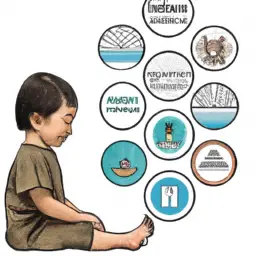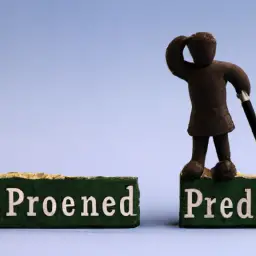Are you struggling to achieve the academic success you desire? It may be time to start focusing on developing your grit and emotional intelligence.
Grit, defined as the ability to persevere through challenges and setbacks, and emotional intelligence, defined as the ability to understand and manage your emotions and those of others, are both crucial factors in achieving academic success.
Research has shown that individuals who possess high levels of grit and emotional intelligence tend to have higher grades, better attendance, and are more likely to graduate from college.
But how do these traits relate to academic success? By developing grit, you are better able to push through difficult tasks and setbacks, which is especially important in the face of academic challenges. Emotional intelligence, on the other hand, allows you to better understand and manage your emotions, which can lead to improved self-regulation and decision-making in academic settings.
In this article, we will explore the connection between grit, emotional intelligence, and academic achievement, as well as provide practical tips for developing these traits in yourself and implementing them in education.
Key Takeaways
- Developing grit and emotional intelligence are crucial for academic success.
- Parenting plays a significant role in the development of grit and emotional intelligence.
- Strategies for developing grit and emotional intelligence include setting realistic goals, self-reflection, and seeking support from mentors and peers.
- Implementing grit and emotional intelligence in education can lead to lifelong skills for personal and professional growth.
Definition and Explanation of Grit and Emotional Intelligence
You gotta know what grit and emotional intelligence are if you wanna understand how they can help you achieve academic success.
Grit is a combination of passion and perseverance, which allows individuals to overcome obstacles and setbacks. It is often confused with resilience, which is the ability to bounce back from adversity. However, grit is different because it involves sustained efforts towards long-term goals.
Gritty individuals are determined and focused, and they don’t give up easily. They’re willing to put in the time and effort needed to achieve their goals, even when things get tough.
On the other hand, emotional intelligence is the ability to recognize and manage one’s own emotions, as well as the emotions of others. It is often confused with social intelligence, which is the ability to understand and navigate social situations. However, emotional intelligence is different because it involves a deeper understanding of emotions, and how they can impact behavior and decision making.
Emotionally intelligent individuals are able to regulate their own emotions, and they’re able to empathize with others. They’re also able to communicate effectively, and they’re skilled at resolving conflicts.
The Importance of Grit and Emotional Intelligence in Academic Achievement
When it comes to academic achievement, you need to have grit and emotional intelligence.
These two qualities will help you persevere in the face of challenges, manage your emotions and relationships, and set long-term goals.
Without them, you may struggle to reach your full potential and overcome obstacles on your academic journey.
Perseverance in the Face of Challenges
Despite facing obstacles, you’ve got the ability to push through and achieve academic success with grit and emotional intelligence. Overcoming adversity isn’t easy, but with resilience strategies in place, you can persevere and reach your goals.
Here are four ways to cultivate perseverance in the face of challenges:
-
Develop a growth mindset and focus on learning from failures rather than being discouraged by them.
-
Set realistic goals and break them down into smaller, manageable steps.
-
Practice self-care and prioritize your physical and mental health.
-
Seek support from peers, mentors, and resources such as counseling services when needed. Remember, there’s strength in asking for help.
Ability to Manage Emotions and Relationships
By developing your ability to navigate emotions and relationships, you can become a more well-rounded and effective individual in both your personal and professional life.
Emotional regulation and social skills are two key components of this ability. Emotional regulation involves being able to recognize and manage your own emotions in a healthy and appropriate way, while social skills refer to your ability to communicate and interact effectively with others.
Having strong emotional regulation skills means that you’re able to handle difficult situations without becoming overwhelmed by your emotions. This can be particularly helpful in academic settings, where students are often required to manage stress and anxiety in order to perform well.
In addition, having strong social skills can help you to build positive relationships with your peers and teachers, which can be beneficial both academically and personally. By working to improve your emotional regulation and social skills, you can become a more resilient and successful student.
Long-Term Goal Setting
Set yourself up for success by incorporating long-term goal setting into your daily routine. This allows you to stay focused and motivated towards achieving your aspirations. By setting long-term goals, you give yourself a clear direction to work towards, helping you to stay on track and avoid getting sidetracked by distractions.
Additionally, setting long-term goals can help you to break down larger, more daunting tasks into smaller, more manageable ones that you can work on one at a time. Some benefits of long-term goal setting include increased motivation, improved self-discipline, and greater self-confidence.
To achieve your long-term goals, try breaking them down into smaller, more manageable tasks, and focus on completing them one at a time. You may also find it helpful to track your progress towards your goals, using tools like to-do lists, calendars, or journals to help you stay organized and on track.
Finally, don’t forget to celebrate your successes along the way, as this can help to keep you motivated and focused on achieving your long-term goals.
Research on the Relationship Between Grit, Emotional Intelligence, and Academic Success
Research suggests that a strong correlation exists between an individual’s level of grit, emotional intelligence, and their academic success. Grit refers to an individual’s perseverance and passion for long-term goals, while emotional intelligence involves the ability to recognize, understand, and manage one’s own emotions, as well as the emotions of others. Studies have found that students who possess high levels of grit and emotional intelligence are more likely to perform well academically, as they are better equipped to handle setbacks and challenges that may arise.
One study conducted by Duckworth and colleagues found that high school students who scored high on measures of grit were more likely to graduate and attend college. Additionally, research has also shown that parenting plays a significant role in the development of grit and emotional intelligence. Parents who provide support and encouragement, as well as those who model and reinforce positive behaviors, can help their children develop these important traits. However, cultural differences may also impact the relationship between grit, emotional intelligence, and academic success, as cultural values and beliefs may influence how these traits are perceived and developed in different contexts.
| Factors that Affect Grit and Emotional Intelligence | Impact on Academic Success |
|---|---|
| Parenting | Positive impact |
| Cultural Differences | Variable impact |
By understanding the relationship between grit, emotional intelligence, and academic success, educators and parents can work together to help students develop these important traits, which can lead to greater academic achievement and success in life.
Practical Tips for Developing Grit and Emotional Intelligence
If you want to improve your grit and emotional intelligence, there are several practical tips you can follow.
First, set realistic goals that challenge you but are achievable. This will help you stay motivated and build confidence in your abilities.
Second, practice self-reflection to identify your strengths and weaknesses, and work on improving areas where you struggle.
Finally, seek support from mentors and peers who can provide guidance and encouragement along the way.
By following these tips, you can develop the skills you need to achieve academic and personal success.
Set Realistic Goals
You’ll be more likely to achieve your academic goals if you start by breaking them down into smaller, more manageable tasks. Setting realistic goals is the key to success. You need to assess your abilities and set goals that are challenging but achievable. Breaking down your larger goals into smaller steps can help you make progress more quickly and keep you motivated.
Along the way, you’re likely to encounter obstacles. It’s important to remember that setbacks are a normal part of the process. When you face challenges, try to stay focused on your goals. Think about what you can do to overcome the obstacles in your way. You might need to adjust your plan, seek help from a teacher or mentor, or simply keep working hard.
By setting realistic goals and staying focused on them, you’ll be better equipped to overcome obstacles and achieve success in your academic pursuits.
Practice Self-Reflection
Take some time to reflect on your progress and identify areas where you can improve by asking yourself questions and being honest with yourself. Self-reflection is a powerful tool that can help you gain a deeper understanding of yourself, your emotions, and your behavior.
By taking a step back and examining your thoughts and actions, you can start to identify patterns and habits that may be holding you back from achieving your goals. One of the benefits of self-reflection is that it can help you develop emotional intelligence.
By examining your own emotions and reactions to different situations, you can start to understand how others may be feeling as well. This can help you become more empathetic and better able to communicate with others.
There are many techniques for self-reflection, including journaling, meditation, and talking to a trusted friend or mentor. Whatever method you choose, the key is to be honest with yourself and open to feedback from others.
By practicing self-reflection regularly, you can develop the grit and resilience you need to overcome obstacles and achieve academic success.
Seek Support from Mentors and Peers
Getting support from mentors and peers can be a game-changer in your journey towards academic success. Whether you’re struggling with a particular subject or just need some guidance on how to balance school and personal life, having someone to turn to for advice and support can make all the difference.
Mentorship benefits can include personalized feedback, encouragement, and networking opportunities, all of which can help you reach your goals faster and with more confidence.
In addition to mentorship, peer support effectiveness shouldn’t be underestimated. Connecting with classmates who share your goals and challenges can create a sense of community and accountability that can motivate you to push yourself harder.
This can be especially helpful in group projects or study sessions, where you can collaborate and learn from each other’s strengths and weaknesses. By seeking support from mentors and peers, you can build a network of like-minded individuals who’ll support you throughout your academic journey and beyond.
Implementation of Grit and Emotional Intelligence in Education
Implementing grit and emotional intelligence in education can help students not only achieve academic success, but also develop lifelong skills for personal and professional growth. By teaching students how to persevere through challenges and manage their emotions, educators can equip them with the tools they need to succeed in all aspects of their lives. Furthermore, incorporating these skills into the classroom can lead to increased student engagement and motivation, as students learn to take control of their own learning and strive for excellence.
To effectively implement grit and emotional intelligence in education, it is important for teachers to receive training on how to teach these skills to their students. This training can include strategies for modeling grit and emotional intelligence, as well as techniques for creating a positive and supportive classroom environment. Additionally, teachers can collaborate with mentors and peers to exchange ideas and best practices for incorporating these skills into their lesson plans. By working together to promote grit and emotional intelligence in education, teachers can help their students reach their full potential and achieve success both academically and personally.
| Grit and Emotional Intelligence in Education | Benefits for Students | Benefits for Teachers | ||
|---|---|---|---|---|
| Increased student engagement | Improved classroom management | Enhanced teacher-student relationships | ||
| Better decision-making skills | Improved student behavior | Increased job satisfaction | ||
| Lifelong skills for personal and professional growth | Improved academic performance | Improved teacher efficacy | ultimately leading to improved student outcomes and success. |
Frequently Asked Questions
What is the difference between grit and emotional intelligence?
When it comes to developing grit and emotional intelligence in children, it’s important to understand the difference between the two.
Grit is all about perseverance and sticking to long-term goals, while emotional intelligence is about understanding and managing one’s own emotions as well as the emotions of others.
Both are important skills to teach in schools, as they can lead to better academic achievement and overall success in life.
By helping children develop grit, they can learn to overcome challenges and push through difficult situations. And by teaching emotional intelligence, children can learn to communicate effectively, manage conflicts, and build strong relationships with others.
Overall, developing these skills in children is crucial for their personal and academic growth, and should be a priority for educators and parents alike.
How do grit and emotional intelligence affect career success outside of academia?
To succeed in your career outside of academia, it’s crucial to develop grit and emotional intelligence in the workplace. Grit is the perseverance and passion to achieve long-term goals, while emotional intelligence is the ability to recognize and manage your own emotions and the emotions of others.
These skills are important in entrepreneurship, where the ability to persist through challenges and handle difficult situations is necessary for success. Developing grit and emotional intelligence can also lead to better communication and collaboration with colleagues, which can result in increased productivity and success in the workplace.
Overall, incorporating these skills into your work life can greatly enhance your career success.
Are there any negative consequences of having too much grit or emotional intelligence?
You may be wondering if there are any negative consequences of having too much grit or emotional intelligence. The truth is, there can be.
One potential drawback of having too much grit is burnout. When you’re constantly pushing yourself to the limit, without taking breaks or time for self-care, you may become exhausted and lose motivation.
Similarly, if you have too much emotional intelligence, you may become insensitive to others’ emotions because you’re so focused on your own.
It’s important to find a balance between grit and emotional intelligence, and to prioritize taking care of yourself and others.
Do cultural differences affect the relationship between grit, emotional intelligence, and academic success?
When it comes to cultural influences on academic success, there are many factors to consider. For example, certain cultures may place more value on education than others, leading to higher academic achievement overall.
Additionally, gender differences may play a role in academic success, with one gender being more encouraged or supported in their academic pursuits than the other. However, it’s important to note that these cultural and gender differences may also impact the development and expression of traits like grit and emotional intelligence.
These traits have been linked to academic success in previous studies. Further research is needed to better understand the complex relationship between culture, gender, and academic achievement.
Can grit and emotional intelligence be improved in adulthood or are they primarily developed during childhood?
Improving skills and adult development are deeply intertwined. It’s widely accepted that as an adult, you can continue to develop your skills and learn new ones.
This is true for both hard skills, such as programming or writing, and soft skills, such as communication or leadership. While some skills may be more difficult to learn as an adult, it’s certainly not impossible.
Through dedication, practice, and a willingness to learn, you can improve your skills and become better at almost anything. This includes developing grit and emotional intelligence, which are crucial for success in both personal and professional settings.
While these skills may be nurtured during childhood, they can certainly be improved upon as an adult. With the right mindset and approach, anyone can develop these skills and improve their overall well-being.
Conclusion
Congratulations, you’ve reached the end of this informative article about the connection between grit, emotional intelligence, and academic achievement.
As you’ve learned, grit refers to the perseverance and passion for long-term goals, while emotional intelligence is the ability to recognize and manage one’s own emotions and those of others. Both of these characteristics are essential for academic success.
Research has shown that students with higher levels of grit and emotional intelligence are more likely to achieve academic success, as they’re better equipped to handle challenges and setbacks. Moreover, developing these traits can be beneficial not only for academic success but also for personal and professional growth.
To develop grit and emotional intelligence, it’s crucial to practice self-awareness, self-regulation, social awareness, and relationship management. Educators can also implement strategies to promote these traits in students, such as providing opportunities for goal-setting, reflection, and feedback.
By developing grit and emotional intelligence, you can not only achieve academic success but also lead a more fulfilling life. So, keep practicing and never give up on your goals!















































































































